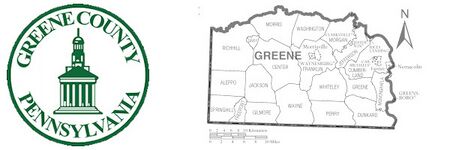Greene County PA
- Members
Greene County is a county in the U.S. state of Pennsylvania. As of the 2010 census, the population was 38,686. Its county seat is Waynesburg. Greene County was created on February 9, 1796, from part of Washington County and named for General Nathanael Greene.
Greene County is part of the Pittsburgh media market. It is in the area of southwestern Pennsylvania that was claimed by Virginia, the District of West Augusta.
Activities

|
Tri-State Region-PA-WV-OH-Food System Project | |
| This project intends to develop and implement a plan to increase the supply of local food available to residents of the Pittsburgh food shed (200 mile radius) in several states. By using a data-driven strategic plan as a guide, it envisions a series of targeted interventions to increase the number of producers, add to the variety of the local food inventory, create and enhance aggregation entities to the distribution system, reduce choke-points in supply chains, expand the number of distribution opportunities, and organize consumer demand in ways that improve the equitability of the food system. | ||
